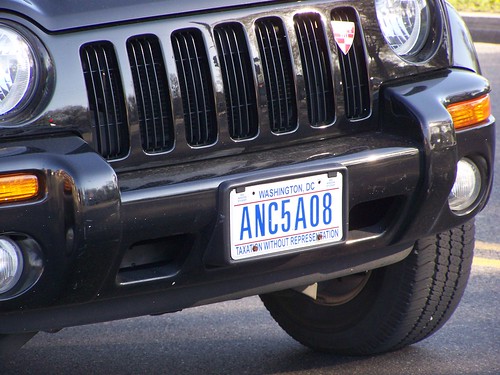DC's Advisory Neighborhood Commissions: What they do, How to Run and Why you Should!
From EmpowerDC:
Wednesday, July 18th 2012
6:30-8:30 PM
Watha T. Daniel Public Library
1630 7th St, NW (Shaw Metro Station)
With Special Guests:
Gottlieb Simon
Director, Office of Advisory Neighborhood Commissions
Kathy Fairley
Special Assistant, DC Board of Elections & Ethics
ANC Commissioners:
Darrell Gaston (8B03), Sylvia Brown (7C04) and Keith Silver (6C01)
sharing their experiences, successes and challenges
LOOK UP YOUR ANC HERE
New ANC boundaries will be in effect for the Nov 6th election. Candidates must live in the Single Member District for which they are running for 60 days prior to the election, and be age 18 by the date of the election. Candidates can collect 25 signatures to appear on the ballot or run a write-in campaign. Petitions are available now through August 8th. Come find out more!
---------
 ANCs in DC are grassroots level government structures, with the statutory right to "weigh in" on matters before DC Government agencies from plans to zoning matters and alcoholic beverage licensing issues. Some ANC commissioners have gone on to become City Councilmembers or work for various DC Government agencies (the latter, personally, I think can present conflicts of interest).
ANCs in DC are grassroots level government structures, with the statutory right to "weigh in" on matters before DC Government agencies from plans to zoning matters and alcoholic beverage licensing issues. Some ANC commissioners have gone on to become City Councilmembers or work for various DC Government agencies (the latter, personally, I think can present conflicts of interest).AND many ANC commissioners believe that "great weight" means that city agencies have to defer to the position of ANCs, which isn't the case.
There is no real training structure for ANCs, so they can be either great or terrible. A big problem is "personalization vs. process." Like a lot of politicians, ANC commissioners want to make the office about them, rather than to work the process and fairness of government.
Some of my writings on the general subject of ANCs are:
- Another failure to lead: DC's Advisory Neighborhood Commissions
- System transformation or people vs. systems and structures
- Contempt of the citizenry
- Stultified vs. flat organizations, democracy vs. autocracy
- ANCs and civic engagement
- "Incentivizing" ANC Commissioners
- An aha! moment about why DC Government is "problematic"
- The Agony of Defeat
- YIMBYs from Brooklyn to DC -- Thinking about Community Participation in Shaping Development"
- ANCs build up political muscle, and yet....
The well functioning ANCs tend to involve residents in the operations of standing committees. The less well functioning ANCs tend to (1) not have standing committees and (2) don't involve residents in the operations of those committees. The law creating ANCs allows for non-elected commissioners to serve on committees, even chair them, but most ANCs do not exercise this aspect of citizen involvement in their operation.
When I first learned about this type of government structure, I was in college, and they had similar structures in Columbus, Ohio. Representation wasn't by geography, but by stakeholder group, so college students were represented, as well as merchants from the local commercial districts and residents.
I thought it was a really neat idea.
While I still think that some form of local government participation structure needs to exist at a level subsidiary to the City Council in cities, and there are various forms of which it can take (see "The uncreative city #2: neighborhood capacity building and leveraging the power of proximity and networking" and "(Even more on) ANCs (Advisory Neighborhood Commissions in DC)"), I am a little less enamored of ANCs from the standpoint of supporting civil society in DC.
There are two negative aspects. One is that they "cream off" the better leadership available within neighborhoods, so that other civil society organizations such as community associations, garden clubs, friends organizations, and the like have a difficult time maintaining operation with quality leadership.
The second is that I think the presence of local government structures such as ANCs can contribute to a kind of "governmentalizing" (like the concept of infantilization) any and all neighborhood issue to one that needs to be "solved" by "government" rather than through self-help and the response by interested citizens/residents who care enough about the issue to organize, tackle the problem and to propose, create and implement solutions.
In any case, building robust capacity building institutions would be the first step to improving grassroots "governance" systems in DC. And the second necessary step is in building the right organizational support structures, especially around financial management, to reduce the likelihood of corruption and to just make it easier for commissioners to focus on substance issues, rather than spend a lot of time on organizational form matters. See "Networked solutions" for some problems with ANCs in DC" and "A neat solution to (some of the) petty corruption in DC government-related civic organizations."
In the meantime, getting more people who understand this running and serving as ANC Commissioners would be an important step towards general improvement of the ANC concept in practice.
Labels: civic engagement, electoral politics, electoral politics and influence, ethics, participatory democracy and empowered participation, progressive urban political agenda, provision of public services



1 Comments:
Excellent article! We will be linking to this great article on our site.Keep up the great writing.
Post a Comment
<< Home